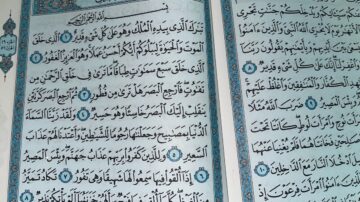Introduction to Surah Al-Mulk
Surah Al-Mulk, also known as “Tabarak,” is a Makkan surah with several names. Al-Alusi mentioned that it is called “Al-Mani’ah,” “Al-Munjiyah,” and “Al-Mujadilah” due to its many virtues established through Hadiths of Prophet Muhammad (PBUH).
Named Surah Al-Mulk because it begins with the glorification of God, who holds dominion over the heavens and the earth, possessing absolute authority to control the universe. He gives life and death, honors and humiliates, enriches and impoverishes, and grants or withholds as He pleases. The surah is also known as “Al-Waqiyah” and “Al-Munjiyah” because it protects and saves from the punishment of the grave and intercedes for its reciter.
Ibn Abbas called it “Al-Mujadilah” because it argues on behalf of its reader in the grave. It was revealed after Surah Al-Mu’minun and before Surah Al-Haqqah, containing thirty-one verses in the Makkan manuscript and thirty verses in others.
Relation to the Previous Surah
This surah connects to the preceding one in two ways:
General Connection
This surah affirms the overall message of the previous one, Surah At-Tahrim. The previous surah illustrates God’s power, His support for His Messenger Muhammad (PBUH) against potential plots by two of his wives. This surah elaborates that God holds dominion over the heavens and the earth and is capable of everything.
Specific Connection
In the end of Surah Al-Tahrim, God presents two unique examples of disbelievers (the wives of Noah and Lot) and believers (the wife of Pharaoh and Mary, the virgin). This surah demonstrates God’s comprehensive knowledge and control, showing His ability to manifest wonders in His creation. The disbelief of Noah’s and Lot’s wives did not prevent their connection to noble prophets, and the faith of Pharaoh’s wife was not harmed by her connection to the tyrant Pharaoh. Similarly, Mary’s faith remained unshaken by her miraculous pregnancy with Jesus (PBUH).
Contents of Surah Al-Mulk
Surah Al-Mulk, like other Makkan surahs, focuses on fundamental tenets of faith such as affirming God’s existence, greatness, and omnipotence. It starts with glorifying God, highlighting His majesty, dominion, and control over the universe, and His power to give life and death (verses 1-2).
It then emphasizes the evidence of God’s existence through His creation of the seven heavens, adorned with stars, which serve as missiles against devils and other manifestations of His power and knowledge (verses 3-5).
The surah continues to describe the preparation of Hell’s torment for disbelievers and the promise of forgiveness and great reward for believers, balancing warning and encouragement in typical Quranic style (verses 6-12).
It further illustrates God’s knowledge, power, and blessings, His knowledge of secrets and open matters, His creation and sustenance of humanity, making the earth a suitable abode and protecting it from earthquakes, preserving the sky from raining destructive stones, and holding birds in flight, challenging people to find any helper besides God if He wishes to punish them (verses 13-20).
The surah concludes by affirming the resurrection, stating that only God knows its time, warning deniers of the Prophet’s (PBUH) call, cautioning them against impending punishment, urging reliance on God, and threatening the withdrawal of running water without anyone’s ability to restore it (verses 25-30).
Virtues of Surah Al-Mulk
Many hadiths highlight the virtues of this surah. Imam Ahmad and the four Sunan compilers reported from Abu Huraira that the Prophet (PBUH) said: “There is a surah in the Quran of thirty verses that interceded for a man until he was forgiven: ‘Blessed is He in whose hand is dominion.'” (Tirmidhi: Hasan).
Al-Tabarani and Al-Dhiya al-Maqdisi narrated from Anas ibn Malik that the Prophet (PBUH) said: “A surah in the Quran argued on behalf of its reciter until it brought him into Paradise: ‘Blessed is He in whose hand is dominion.'”
Tirmidhi reported from Ibn Abbas, who mentioned the surah being called “Al-Waqiyah” and “Al-Munjiyah.” The Prophet (PBUH) said: “It is the protector; it is the savior, saving from the punishment of the grave.” (Gharib hadith).

